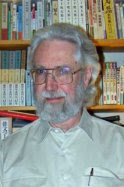This just in from
Lenard D. Moore:
The new issue of
Simply Haiku is online. Simply Haiku is an International Japanese Short Form Journal read by over 6,000 people worldwide
Winter Issue
~~~~~~~~~~~~~~~~~~~~~~~~~~
FEATURING:
Assimilation of the Ma Aesthetic Better Equips Western Poets to Write Haiku
by Denis M. Garrison
A Brilliant Literature: Robert Wilson
Interviews Professor Richard Gilbert
by Robert D. Wilson
An Interview with An Xiao
by Robert D. Wilson
Fulfilling My Dream of Performing Tanka
by Mariko Kitakubo,
translated by Amelia Fielden
Tanka by Kisaburo Konoshima
Newly translated by David Callner
Contemplative Haiku:
Raquel D. Bailey
Tara Betts
Jared Carter
L. Teresa Church
Desiree Cooper
Susan Delphine Delaney
Fredua-Agyeman Nana
David Serjeant
Nora Wood
Tantalizing Tanka:
Cathy Drinkwater Better
Joe Christensen
Sanford Goldstein
M. Kei
Bob Lucky
Joyce Maxner
Patrick Pilarski
Fujiko Sato
Captivating Haibun:
hortensia anderson
Ludmila Balabanova
Tish Davis
Sharon Dean
Ken Jones
Jim Kacian
ed markowski
Stanley Pelter
Patrick M. Pilarski
Joanna Preston
Ray Rasmussen
John W. Sexton
Jeffrey Woodward
Hot Senryu:
SENRYU ON A PUN-pt. 2
~ Belly Peterson, Bob Brill,
Alexis Rotella, Carol Raisfeld,
Dana-Maria Onica, Barry George,
Ted Heavens
Home Sweet Home
~ Alexis Rotella, Anita Virgil,
Mykel Board, Gautam Nadkarni,
Christopher Patchel, Bob Lucky,
Liam Wilkinson, Barry George,
Arizona Zipper, John Stevenson,
David Gershator
Community
~ Matthew Cariello, Francis Masat,
Gautam Nadkarni, Carol Raisfeld,
Roberta Beary, Ed Markowski,
Jerry Kilbride, Christopher Patchel,
Michael Dylan Welch, John Stevenson,
Jian Zheng, kala ramesh, Anita Virgil,
Pamela A. Babusci, Alexis Rotella,
Barry George, M. Franklyn Teaford
Sizzling and Innovative Renku:
Kasen:
Bamboo Greeting
~ The Miner School of Haikai Poets,
comprising Keith Kumasen Abbot, Maureen Owen,
Pat Nolan and Michael Sowl
Bamboo Greeting, with verse-by-verse annotation by the authors
The Miner School of Haikai Poets – History and Biographies
Triparshva:
Tarried Road Workers
~ Barbara A Taylor, Moira Richards,
Claire Chatelet
Shisan:
The Piñon's Tears
~ Effie Araouzou, Dorothy Heiderscheit,
Nora Hussey, Virginia Jennings,
Frances Kelleher, Marion Kerrigan,
Beatrice Mondare, Bernie O'Reilly,
Kim Richardson and Maeve O'Sullivan
New Shisan:
October's Moon –
dedicated to the memory of William J. Higginson
~ Moira Richards and Norman Darlington
Innovative Modern Haiga:
Ross Coward
Linda Pilarski
Alexis Rotella
Claudette and Frank Russell
Manoj Saranathan
Aesthetic Traditional Haiga:
Ed Baker
Mark Smith
Janis Zroback and Allan Burns
BOOK REVIEWS
Robert D. Wilson:
Early Modern Japanese Literature,
edited by Haruo Shirane
In Two Minds, by Amelia Fielden and
Kathy Kituai
The Tanka Prose Anthology,
edited by Jeffrey Woodward
Johnye Strickland:
The Horse with One Blue Eye,
by Cherie Hunter Day
Kindle of Green,
by Cherie Hunter Day and David Rice
And, of course, lots of CONTEST NEWS!
____________________________________
____________________________________
ALL ISSUES ARE ARCHIVED for 24/7 access
____________________________________
____________________________________
SIMPLY HAIKU
"The online showcase for Japanese short form poetry"







